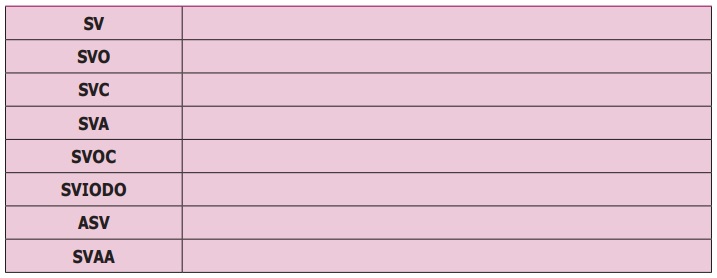Conjunctions / Connectors, Sentence Pattern - Grammar | 8th English : Unit 4 : Prose : My Reminiscence
Chapter: 8th English : Unit 4 : Prose : My Reminiscence
Grammar
Grammar
Conjunctions / Connectors
‘Connector’ is a word or a phrase that joins two sentences or group of words, together. They are also known as ‘conjunctions’.
Coordinating Conjunctions links two or more words, clauses, phrases or sentences of equal importance.
Some common Coordinating conjunctions are:
and, but, or, therefore, as well as, too, else, otherwise, still, yet, while, however, so, consequently, for, etc…

She ran fast and won the race.
Subordinating Conjunction are the words that links a dependent clause to an independent clause.
Some common Subordinating conjunctions are: after, as, until, unless, when, whenever, as soon as, as if, as though, because, before, even if, even though, if, since, so that, though, till, where, wherever, whether, while, why, etc……

The bus had left before he came.
A correlative conjunction is a type of conjunction that functions in a pair.
Some common Corelative conjunctions are: either…or, both….and, neither….nor, not only…. but also, such...as, such....that, so....as, as....as, as. so, no sooner.... than, rather....than, whether or.

I am not only a singer but also a musician.
I. Coordinating Conjunctions
These conjunctions join words, phrases or clauses of equal rank.
Example:
i. She ran fast and won the game.
ii. God made the country and man made the town.
iii. Get ready soon or you will miss the bus.
iv. I requested him but he did not do the work.
v. Behave well else you will suffer.
II. Subordinate conjunctions.
These conjunctions join two clauses. One of which is subordinate to the other
OF TIME
i. Make hay while the sunshines.
ii. Ravi reached the exam hall before the school bell had rung.
OF PLACE
Where, wherever, whence, whither
i. You will find your books where you had placed them.
ii. You can see the beauty wherever you go in Ooty.
OF CONCESSION:
Though, although, eventhough
i. The alarm woke me up, eventhough it wasn't very loud.
ii. The child was not covered, although it was very cold.
OF COMPARISON:
as, than
i. He is not as clever as you.
ii. Rekha is better than her father.
III. Correlative conjunctions
These pairs of conjunctions require equal structures after each one.
i. Shruthi wants either the chocolates or the cake.
ii. She said that she would like to have both the chocolates and the cake.
iii. You can have neither the cake nor the ice-cream.
vi. I have not yet decided whether I will have the cake or the ice-cream.
v. She ate not only the chocolates but also the ice-cream.
iv. Abirami is both cute and lovely.
a. Underline the conjunctions in the following sentences.
1. Revathy and Rohini are friends.
Answer: Revathy and Rohini are friends.
2. If you say so, I will believe it.
Answer: .If you say so, I will believe it.
3. Shekar is intelligent but careless.
Answer: Shekar is intelligent but careless.
4. The bus was overcrowded so Arun avoided travelling in it.
Answer: .The bus was overcrowded so Arun avoided travelling in it.
5. Though Vinay is ill, he doesn't skip the class.
Answer: Though Vinay is ill, he doesn’t skip the class.
b. Fill in the blanks in the following sentences with suitable conjunctions from the box:
if | after | unless | until | and | till | although | so | because | but
1. I returned home after the bus had started.
2. I respect him although he is very strict.
3. Sudharshan will succeed because he works hard.
4. Aravinth and Arun are classmates from their childhood.
5. You can’t have your fruits unless you take your food.
c. Choose the correct conjunctions from the options given in the brackets.
1. Everyone likes him because he is very helpful. (because/for)
2. so it was cloudy, we decided to take an umbrella. (so/as)
3. Rathi found her watch where she had left it. (wherever/where)
4. I don’t know whether I can afford to buy a new dress or not. (whether/why)
5. as he was ill, he went to the doctor. (as/though)
GRAMMAR ADDITIONAL
CONJUNCTIONS
A conjunction is a joining word that joins words, groups of words or sentences.
1. Co-ordinating conjunctions join sentences of equal rank.
Answer: Ravi is singing and Raj is playing the guitar.
2. Subordinating conjunctions join sentences of unequal rank.
Answer: I rang up my mother because she was not at home.
3. Correlative conjunctions are used in pairs.
Answer: Produce your hall ticket so that you may write the exam.
Join the pair of sentences using - and, but, or.
1. Our English teacher is fair. Our science teacher is dark.
Answer: Our English teacher is fair but our science teacher is dark.
2. My brother has a motor bike. He has a car, too.
Answer: My brother has a motor bike and a car.
3. The cup fell. It did not break.
Answer: The cup fell but it did not break.
4. Keep quiet. Go away.
Answer: Keep quiet or go away.
5. He is honest. He is hard working.
Answer: He is honest and hard working.
a) Fill in the blanks with Co-ordinating conjunctions :
1. Eat the cake with a spoon-------------- fork, (but, so, or, for)
[Answer: or]
2. Priya refuses to eat eggs --------------will she touch mutton, (for, nor, so, or)
[Answer: nor]
3. Brinda will be late to school------------ she has a doctor appointment, (but, or, for, nor)
[Answer: for]
4. I am a man----------- I don’t wear sari, (so, yet, nor, but)
[Answer: so]
5. Iam a diabetic------------ I eat sweets often, (or, for, so, yet)
[Answer: yet]
b) Fill in the blanks with Subordinating conjunctions :
1. ------------you see them, you will recognise them. (Once, For, And, After)
[Answer: Once ]
2. Did he inform you --------he left? (unless, before, once, if)
[Answer: before ]
3. --------------it rain, the school will work (When, Once, Even if, Unless)
[Answer: Even if ]
4. I met him---------------- I was in Delhi, (after, when, because, if) ,
[Answer: when ]
5. I will never be the same--------------I joined this school, (since, yet, inspite of, if)
[Answer: since ]
c) Fill in the blanks with Correlative conjunctions:
1. I will eat sandwich noodles for breakfast, (either, or / neither, nor / such, that)
[Answer: either, or ]
2. The company deals in-----------------hardware-------------software (whether, or I both, and I not only, but also)
[Answer: both, and ]
3. Prabhu likes------------cricket -------------hockey (either, or / neither, nor / both, and)
[Answer: neither, nor ]
4. I didn’t know------------you will come---------- not (neither, nor / either, or I whether, or)
[Answer: whether, or ]
5. I can drive---------------a bike---------------- a car (neither, nor I either, or I not only, but also)
[Answer: not only, but also ]
Sentence Pattern
A group of words, which gives complete sense is called a sentence. The basic sentence patterns are given below:
1. SV: Child laughs.
2. SVO: I play hockey.
3. SVC: He is smart.
4. SVOC: I painted the car blue.
5. SVIODO: My father presented me a watch.
6. SVDOIO: She gave money to the poor.
Subject (S) To get ‘Subject’ ask the question ‘Who?’ before the verb. It consists of nouns or pronouns and occurs before a verb.
Example:
Nancy danced well. Who danced well? (Here “Nancy” answers for the who?)
The child broke the glass. (Here “The child” answers the question who?)
Verb (V) - A verb shows an action or activity or work done by the subject. It also tells the status. To get 'verb' ask what does the subject do?
Example:
Jems wrote a letter. What did Jems do? (Here wrote answers the question)
He is a doctor.
The baby is crying.
Object (O) - To get the object, ask the question ‘What?’ or ‘Whom?’. ‘What’ is for things and ‘Whom’ is for persons. Persons may be nouns or pronouns.
Example: He bought a pen. He handles the computer. I saw him.
Direct Object (DO) - Direct object answers the question ‘what’.
I like animals.
Indirect Object (IO) - Answers the question ‘whom’?
I gave Rosy a pen.
Complement (C) - The words, required to complete the meaning of a sentence are called Complement.
Example: He is a dentist. She named the boy John. It grew dark. Object complement answers for the questions "How" asked on the object.
Example: He painted the car blue. How did he painted the car?
Here the word blue answers for the question "How" asked on the object car.
Example: We call Kamarajar Karmaveerar.
They selected her leader.
Adjunct (A) - To get ‘Adjunct’ ask the question where ,how, when or why.
Example: My father is a farmer in thiruvarur.

a. Choose the right pattern.
1. The wall collapsed.
A. SV
B. SVO
C. SVIODO
[Answer: (a) SV]
2. During the war, many people lost their homes.
A.SVO
B. SVIODO
C. ASVO
[Answer: (c) ASVO]
3. I promised the children a trip to the zoo.
A. SVO
B. SVDOIO
C. SVIODO
[Answer: (c) SVIODO]
4. In 1998, Frank moved to London.
A. ASVA
B. ASVO
C. SVIODO
[Answer: (a) ASVA]
5. Pooja hired a bicycle.
A. SV
B. SVO
C. SVA
[Answer: (b) SVO]
b. Write two sentences for each pattern.

1. SV
Answer:
They walked.
We studied.
2. SVO
Answer:
She ate the food.
Ravi kicked the ball.
3. SVC
Answer:
He is a surgeon.
My father is a painter.
4. SVA
Answer:
We stay in Chennai.
They danced gracefully.
5. SVOC
Answer:
John made Jane angry.
He made him the captain.
6. SVIODO
Answer:
My mother gave me a beautiful frock.
He presented my dad a watch.
7. ASV
Answer:
Yesterday, we arrived.
In 2019 they succeeded.
8. SVAA
Answer:
They came by bus yesterday.
The bank opens at 10 a.m. tomorrow.
GRAMMAR ADDITIONAL
SENTENCE PATTERN
Identify the pattern
of the following sentence:
1. This shoe is large.
(a) S V O
(b) S V C
(c) S V A
(d) S V O C
[Answer: b) S V C]
2. His father gave him
his school bag.
(a) S V C
(b) S V O C
(c) S V O
(d) SV IO DO
[Answer: (d) S V IO DO]
3. The player entered
the room.
(a)SVO
(b)SVA
(c) S V C
(c) S V O
[Answer: (c) S V A]
4. Eve - Teasers must
be punished severely.
(a) S V A C
(b) S V C
(c) S V O
(d) S V A
[Answer: (d) S V A]
5. We wear woolen
clothes in winter season.
(a)S V O C
(b) SV IO DO
(c) S V O A
(d) S V O
[Answer: (c) S V O A]
6. I shall meet you
tomorrow.
(a)S V O
(b) SV IO DO
(c) S V O A
(d) S V O C
[Answer: (c) S V O A]
7. He answered my
question instantly.
(a) S V O C
(b) S V C A
(c) S V IO DO
(d) S V O A
[Answer: (d) S V O A]
8. They named the
child Prem.
(a)S V A C
(b)S V O C
(c) S V C A
(d) S V IO DO
[Answer: (c) S V C A]
9. We completed the
work on time.
(a)S V O C
(b)S V A C
(c) S V O A
(d) S V C
[Answer: (c) S V O A]
10. The meeting ended
with a vote of thanks.
(a) S V A
(b) S V C
(c) S V O
(c) S V O A
[Answer: (a) S V A]
Related Topics